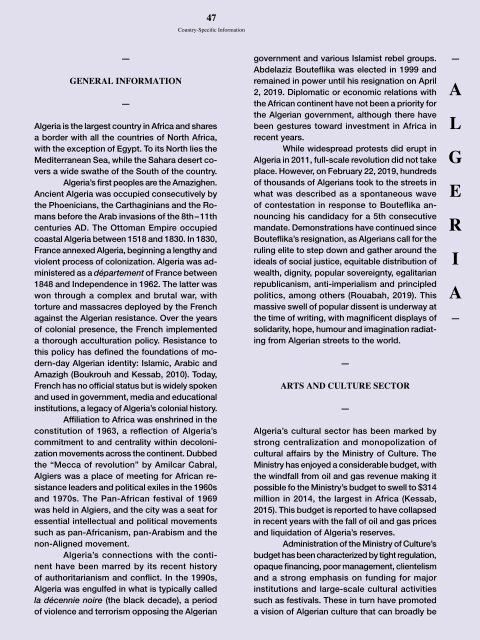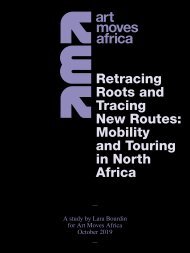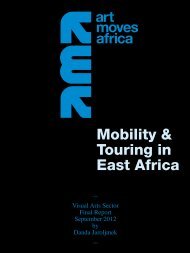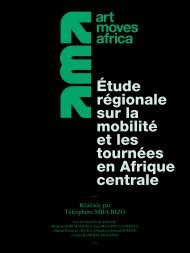Art Moves Africa – Retracing Roots and Tracing New Routes: Mobility and Touring in North Africa
A study by Lara Bourdin for Art Moves Africa, October 2019
A study by Lara Bourdin for Art Moves Africa, October 2019
- No tags were found...
Create successful ePaper yourself
Turn your PDF publications into a flip-book with our unique Google optimized e-Paper software.
47<br />
Country-Specific Information<br />
—<br />
GENERAL INFORMATION<br />
—<br />
Algeria is the largest country <strong>in</strong> <strong>Africa</strong> <strong>and</strong> shares<br />
a border with all the countries of <strong>North</strong> <strong>Africa</strong>,<br />
with the exception of Egypt. To its <strong>North</strong> lies the<br />
Mediterranean Sea, while the Sahara desert covers<br />
a wide swathe of the South of the country.<br />
Algeria’s first peoples are the Amazighen.<br />
Ancient Algeria was occupied consecutively by<br />
the Phoenicians, the Carthag<strong>in</strong>ians <strong>and</strong> the Romans<br />
before the Arab <strong>in</strong>vasions of the 8th <strong>–</strong> 11th<br />
centuries AD. The Ottoman Empire occupied<br />
coastal Algeria between 1518 <strong>and</strong> 1830. In 1830,<br />
France annexed Algeria, beg<strong>in</strong>n<strong>in</strong>g a lengthy <strong>and</strong><br />
violent process of colonization. Algeria was adm<strong>in</strong>istered<br />
as a département of France between<br />
1848 <strong>and</strong> Independence <strong>in</strong> 1962. The latter was<br />
won through a complex <strong>and</strong> brutal war, with<br />
torture <strong>and</strong> massacres deployed by the French<br />
aga<strong>in</strong>st the Algerian resistance. Over the years<br />
of colonial presence, the French implemented<br />
a thorough acculturation policy. Resistance to<br />
this policy has def<strong>in</strong>ed the foundations of modern-day<br />
Algerian identity: Islamic, Arabic <strong>and</strong><br />
Amazigh (Boukrouh <strong>and</strong> Kessab, 2010). Today,<br />
French has no official status but is widely spoken<br />
<strong>and</strong> used <strong>in</strong> government, media <strong>and</strong> educational<br />
<strong>in</strong>stitutions, a legacy of Algeria’s colonial history.<br />
Affiliation to <strong>Africa</strong> was enshr<strong>in</strong>ed <strong>in</strong> the<br />
constitution of 1963, a reflection of Algeria’s<br />
commitment to <strong>and</strong> centrality with<strong>in</strong> decolonization<br />
movements across the cont<strong>in</strong>ent. Dubbed<br />
the “Mecca of revolution” by Amilcar Cabral,<br />
Algiers was a place of meet<strong>in</strong>g for <strong>Africa</strong>n resistance<br />
leaders <strong>and</strong> political exiles <strong>in</strong> the 1960s<br />
<strong>and</strong> 1970s. The Pan-<strong>Africa</strong>n festival of 1969<br />
was held <strong>in</strong> Algiers, <strong>and</strong> the city was a seat for<br />
essential <strong>in</strong>tellectual <strong>and</strong> political movements<br />
such as pan-<strong>Africa</strong>nism, pan-Arabism <strong>and</strong> the<br />
non-Aligned movement.<br />
Algeria’s connections with the cont<strong>in</strong>ent<br />
have been marred by its recent history<br />
of authoritarianism <strong>and</strong> conflict. In the 1990s,<br />
Algeria was engulfed <strong>in</strong> what is typically called<br />
la décennie noire (the black decade), a period<br />
of violence <strong>and</strong> terrorism oppos<strong>in</strong>g the Algerian<br />
government <strong>and</strong> various Islamist rebel groups.<br />
Abdelaziz Bouteflika was elected <strong>in</strong> 1999 <strong>and</strong><br />
rema<strong>in</strong>ed <strong>in</strong> power until his resignation on April<br />
2, 2019. Diplomatic or economic relations with<br />
the <strong>Africa</strong>n cont<strong>in</strong>ent have not been a priority for<br />
the Algerian government, although there have<br />
been gestures toward <strong>in</strong>vestment <strong>in</strong> <strong>Africa</strong> <strong>in</strong><br />
recent years.<br />
While widespread protests did erupt <strong>in</strong><br />
Algeria <strong>in</strong> 2011, full-scale revolution did not take<br />
place. However, on February 22, 2019, hundreds<br />
of thous<strong>and</strong>s of Algerians took to the streets <strong>in</strong><br />
what was described as a spontaneous wave<br />
of contestation <strong>in</strong> response to Bouteflika announc<strong>in</strong>g<br />
his c<strong>and</strong>idacy for a 5th consecutive<br />
m<strong>and</strong>ate. Demonstrations have cont<strong>in</strong>ued s<strong>in</strong>ce<br />
Bouteflika’s resignation, as Algerians call for the<br />
rul<strong>in</strong>g elite to step down <strong>and</strong> gather around the<br />
ideals of social justice, equitable distribution of<br />
wealth, dignity, popular sovereignty, egalitarian<br />
republicanism, anti-imperialism <strong>and</strong> pr<strong>in</strong>cipled<br />
politics, among others (Rouabah, 2019). This<br />
massive swell of popular dissent is underway at<br />
the time of writ<strong>in</strong>g, with magnificent displays of<br />
solidarity, hope, humour <strong>and</strong> imag<strong>in</strong>ation radiat<strong>in</strong>g<br />
from Algerian streets to the world.<br />
—<br />
ARTS AND CULTURE SECTOR<br />
—<br />
Algeria’s cultural sector has been marked by<br />
strong centralization <strong>and</strong> monopolization of<br />
cultural affairs by the M<strong>in</strong>istry of Culture. The<br />
M<strong>in</strong>istry has enjoyed a considerable budget, with<br />
the w<strong>in</strong>dfall from oil <strong>and</strong> gas revenue mak<strong>in</strong>g it<br />
possible fo the M<strong>in</strong>istry’s budget to swell to $314<br />
million <strong>in</strong> 2014, the largest <strong>in</strong> <strong>Africa</strong> (Kessab,<br />
2015). This budget is reported to have collapsed<br />
<strong>in</strong> recent years with the fall of oil <strong>and</strong> gas prices<br />
<strong>and</strong> liquidation of Algeria’s reserves.<br />
Adm<strong>in</strong>istration of the M<strong>in</strong>istry of Culture’s<br />
budget has been characterized by tight regulation,<br />
opaque f<strong>in</strong>anc<strong>in</strong>g, poor management, clientelism<br />
<strong>and</strong> a strong emphasis on fund<strong>in</strong>g for major<br />
<strong>in</strong>stitutions <strong>and</strong> large-scale cultural activities<br />
such as festivals. These <strong>in</strong> turn have promoted<br />
a vision of Algerian culture that can broadly be<br />
—<br />
A<br />
L<br />
G<br />
E<br />
R<br />
I<br />
A<br />
—







